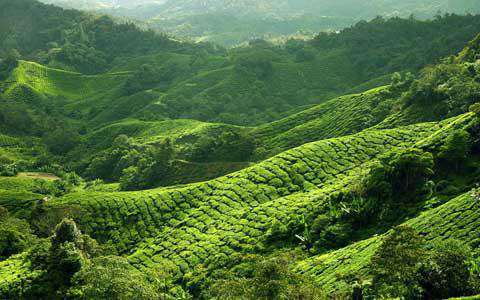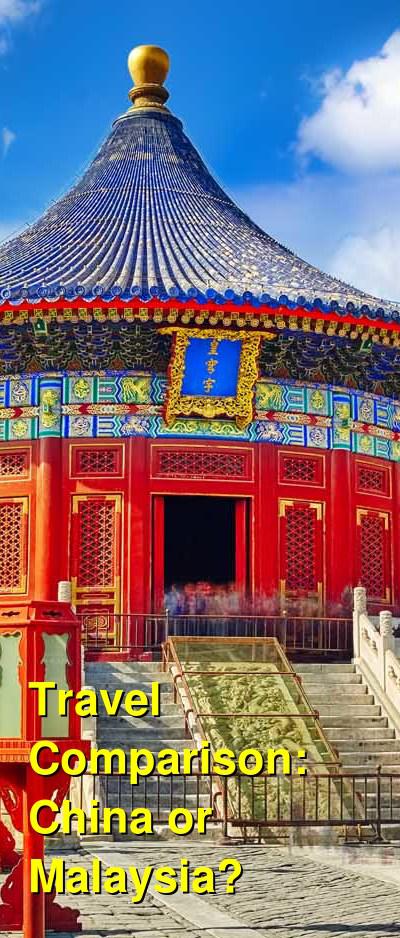Should you visit China or Malaysia?
Malaysia is significantly cheaper than China, for a variety of reasons. From a traveler's perspective, however, these two dynamic nations each offer something a little different.
China is massive, diverse, enigmatic, beautiful, and chaotic. And you should definitely go! But it's hard to summarize the price of everything in a country as large as this. From sprawling metropolises to sparsely populated countryside, the price of travel in China is as diverse as its attractions. Large cities are generally higher in price than the countryside, but overall China is surprisingly affordable.
Malaysia offers a great deal to visitors from gorgeous beaches, crystal clear waters for snorkeling and scuba diving, exotic jungles, cooler highlands with agricultural landscapes, and delicious cuisine.
In general, Malaysia's economy is less driven by tourism than many other countries. This makes it easier to have a more "authentic" experience in Malaysia, as one can mingle with the locals to see how they live and work, as well as vacation along side them instead of having them provide a service for you in the tourism industry.
Which country is cheaper, Malaysia or China?
Should I visit China or Malaysia? This is a popular question for many travelers. By figuring out which country is more expensive, you'll understand where you'll get more bang for your buck. A week in Malaysia can cost you about $569 (per person), while a week in China may cost you around $556. These differences become even more noticable if you plan to spend a longer time in the country. 10 days, two weeks, or even one month of travel to Malaysia or China can really add to your travel budget.
Accommodation is often cheaper in China compared to Malaysia ($34 vs. $43). Budget travelers often stay in cheaper hostels and guest houses, while nicer hotels usually appeal to families and upscale travelers.
Or, compare hostel and guesthouse prices between Malaysia and China to find the cheapest accommodation here: Malaysia hostels and China hostels.
When comparing food in China vs. Malaysia they are not just different in cuisine, but also in price. Meal and restaurant costs in China ($23) are often cheaper than Malaysia ($18).
When is the best time to visit China and Malaysia?
 Huangshan
Huangshan
As China is geographically large, the weather varies by region. The northeast experiences four seasons, while the south is fairly mild and tropical. The west can be cold in the winter as well, and sometimes harsh in the high plateaus and mountains.
In northeastern China, winters can be very cold and less tourists visit during this time. However, some areas have winter festivals (such as Harbin) which bring in large crowds despite the chill. Summers in the northeast can be warm, and sometimes hot and humid. This is still the peak season in this region, especially in Beijing. Traveling in the shoulder season will usually give you lower prices and good weather.
In the south, from Shanghai down and across to southwest China, expect warm weather almost all year. While winters do get a little cooler, it's not much to worry about. For this reason, travelers visit southern China year-round. Some even avoid the warmer summers in favor of the cooler winters.
In the west, the mountains make everything a little more complicated. Even in the usually warm southwest, higher elevations equate to colder weather. As you venture into the northwest, expect frigid winters but mild summers.
Other than weather, the only thing to look out for are the Chinese national holidays. During these times, which usually last a weekend or a whole week, many local Chinese people will be traveling to experience their own country's grand beauty. Expect hotels to be full and transportation to be crowded. You may wish to avoid the country during these times, or hunker down in a smaller city. Make reservations in advance if you can.
Malaysia stays hot and humid throughout the year. Due to shifting seasonal winds, the wet season on the eastern coasts is between November and February, while the wettest months on the western coasts are April and October. These wet seasons are usually not to be of any concern, as the rains are not so bad that they would ruin a vacation. However, scuba diving enthusiasts should take note because the water visibility is dramatically affected during the rainy seasons.
Why is China more expensive than Malaysia?
China's economy has been growing in leaps and bounds in recent years and decades, leading to a growing middle class and rising tourism industry. While competition is keeping prices down, it's not enough, thus tourism prices are generally increasing. Furthermore, with large populations moving to the larger cities looking for work, the overall cost of living is going up.
Malaysia's economy is much less dependent on tourism than some of its neighboring countries. Therefore, visitors usually depend on the same general infrastructure and transportation system as the locals. Public transportation is modern, efficient, and cheap. Accommodation also tends to be better in quality for a lower price in Malaysia due to the overall pro-business economy, and a diverse range of restaurants keeps prices for food competitive throughout the country.
Transportation in China is also become more high-tech. With bullet trains, subway systems, and internet-enabled ride sharing services, moving around is becoming more convenient, but also more expensive.
What are the most expensive and cheapest cities and regions in China and Malaysia?
 BOH Tea Plantation, central Malaysia
BOH Tea Plantation, central Malaysia
Like large cities in any part of the world, with more people comes more diversity in prices. Some of the most expensive hotels and restaurants in China can be found in Beijing and Shanghai, as well as other touristy areas. But at the same time, these crowded cities also offer cheaper options.
Western China can be an expensive region due to its remote location. Here, transportation is pricey, food is more scarce and thus more expensive, and hotels are less frequent. But this enigmatic region can be worth the visit, and isn't too much more expensive than the more populated eastern regions.
Otherwise, some of the most expensive places in China are those that require more activities. A cruise through the famous three gorges, for example, is a must-see, but not so cheap. Hiking in the mountains or visiting famous parks that require entrance tickets, while worth the visit, can add to your travel budget.
Prices in Malaysia are relatively cheap throughout. As the capital city, prices in Kuala Lumpur can be a bit more expensive than in rural areas, but budget options are still plentiful.
If you visit the most popular areas for tourists, such as some of the islands or the Cameron Highlands, you might pay a bit more for a rental car or a tour. Also, public transportation in some touristy areas can be a bit limited, leaving you to take a taxi or rent a car.
Compared to peninsula Malaysia, Borneo can be quite expensive. Although budget accommodation and cheap food are available, most people in Borneo choose to do a variety of activities. This is where the price starts to climb (but is well worth it). Depending on what you choose to do, Borneo can quickly become one of the more expensive places to visit in the area.
How you can save money when visiting China and Malaysia?
Slow down. If you're rushing through the area you're going to spend more money. Transportation costs can be expensive so the more places you visit, the more money you're going to spend.
Use public transportation whenever possible. China's network of trains between cities has grown lately, and high speed rail lines connect every major city in the east, as well as some in the west. Not only is it fast, but it's also affordable.
Look into the price of flights. The Chinese government subsidizes many flights and airlines, leaving you with plenty of ways to get around this huge country fairly quickly.
Stay at locally owned hotels, and eat at local restaurants. The prices are great, the service is great, and you'll have a more enjoyable and authentic experience.
Eat at the markets instead of larger grocery stores. You'll get fresh, authentic food for a much lower price.


 Budget Your Trip is all about finding out how much everything costs so that you can travel cheaper and longer. Created by avid travelers Laurie and Bryan, our goal is to help you plan your next trip on the right budget. With average daily travel costs that are calculated from the budgets of real travelers, plus an analysis of hotel and tour prices, you can find out how much money you need to plan your next adventure. We also have plenty of travel advice, accommodation reviews, and activity suggestions.
Budget Your Trip is all about finding out how much everything costs so that you can travel cheaper and longer. Created by avid travelers Laurie and Bryan, our goal is to help you plan your next trip on the right budget. With average daily travel costs that are calculated from the budgets of real travelers, plus an analysis of hotel and tour prices, you can find out how much money you need to plan your next adventure. We also have plenty of travel advice, accommodation reviews, and activity suggestions.
